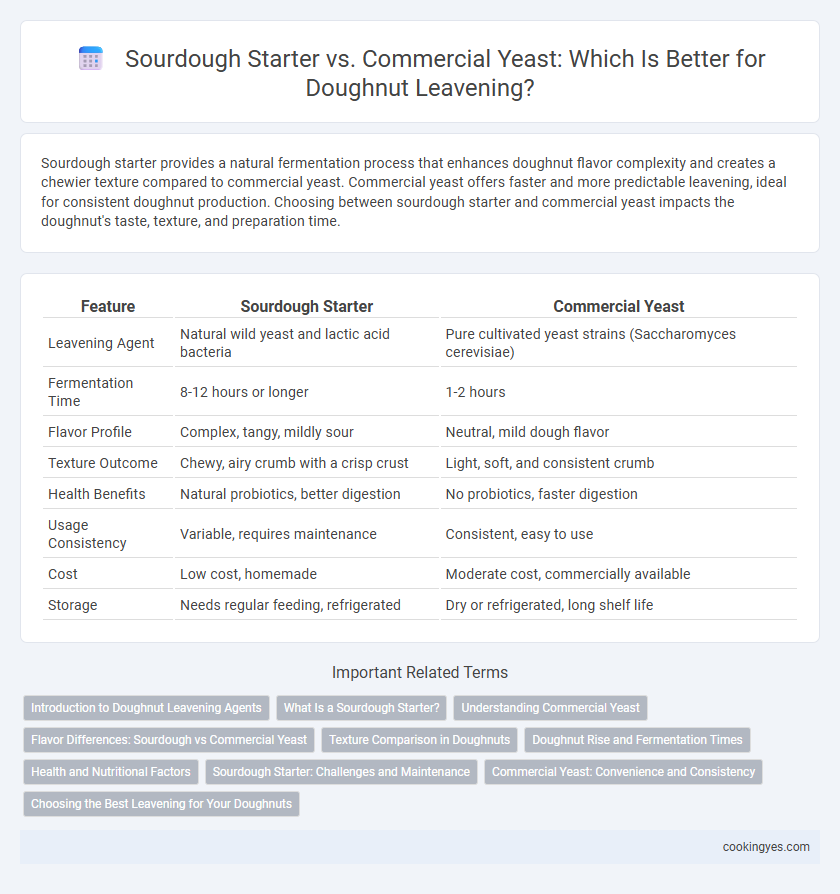Sourdough starter provides a natural fermentation process that enhances doughnut flavor complexity and creates a chewier texture compared to commercial yeast. Commercial yeast offers faster and more predictable leavening, ideal for consistent doughnut production. Choosing between sourdough starter and commercial yeast impacts the doughnut's taste, texture, and preparation time.
Table of Comparison
| Feature | Sourdough Starter | Commercial Yeast |
|---|---|---|
| Leavening Agent | Natural wild yeast and lactic acid bacteria | Pure cultivated yeast strains (Saccharomyces cerevisiae) |
| Fermentation Time | 8-12 hours or longer | 1-2 hours |
| Flavor Profile | Complex, tangy, mildly sour | Neutral, mild dough flavor |
| Texture Outcome | Chewy, airy crumb with a crisp crust | Light, soft, and consistent crumb |
| Health Benefits | Natural probiotics, better digestion | No probiotics, faster digestion |
| Usage Consistency | Variable, requires maintenance | Consistent, easy to use |
| Cost | Low cost, homemade | Moderate cost, commercially available |
| Storage | Needs regular feeding, refrigerated | Dry or refrigerated, long shelf life |
Introduction to Doughnut Leavening Agents
Doughnut leavening relies heavily on the choice between sourdough starter and commercial yeast, each impacting texture and flavor. Sourdough starters provide natural fermentation with complex flavor profiles and a chewier crumb, while commercial yeast offers faster, more predictable rising times for consistent doughnut production. Understanding these agents is crucial for bakers aiming to balance taste, texture, and preparation efficiency.
What Is a Sourdough Starter?
A sourdough starter is a natural leavening agent made by fermenting flour and water, cultivating wild yeast and beneficial bacteria. Unlike commercial yeast, which contains a concentrated strain of Saccharomyces cerevisiae, sourdough starter offers a complex microbial ecosystem that enhances flavor and texture in doughnuts. This natural fermentation process produces lactic acid and acetic acid, contributing to a tangy taste and improved dough elasticity.
Understanding Commercial Yeast
Commercial yeast, typically Saccharomyces cerevisiae, is a highly active leavening agent known for its rapid fermentation and consistent rise in doughnut recipes. It produces predictable carbon dioxide levels, ensuring uniform texture and faster proofing times compared to sourdough starter. The controlled environment and standardized yeast strains make commercial yeast ideal for mass production and achieving reliable doughnut leavening results.
Flavor Differences: Sourdough vs Commercial Yeast
Sourdough starter imparts a complex, tangy flavor to doughnuts due to its natural fermentation and wild yeast strains, enhancing depth and subtle acidity. Commercial yeast, typically Saccharomyces cerevisiae, produces a milder, more consistent rise with a neutral flavor profile that allows other ingredients to dominate. The difference in leavening agents significantly influences the doughnut's taste, with sourdough providing unique, artisanal flavor notes compared to the clean and straightforward flavor from commercial yeast.
Texture Comparison in Doughnuts
Sourdough starter creates doughnuts with a chewier, more complex crumb structure due to natural fermentation, enhancing flavor depth and moisture retention. Commercial yeast produces lighter, airier doughnuts with a consistent texture and quicker rise time, ideal for uniform batches. Choosing sourdough influences a denser, artisanal texture, while commercial yeast favors a softer, pillowy mouthfeel.
Doughnut Rise and Fermentation Times
Sourdough starter provides a slower, natural fermentation process that enhances doughnut rise with complex flavors and a chewier texture, typically requiring 12 to 24 hours for optimal leavening. Commercial yeast offers rapid fermentation, producing a quicker rise within 1 to 2 hours, resulting in a lighter, softer doughnut but with less depth in flavor. The choice between sourdough starter and commercial yeast significantly affects doughnut fermentation times and the final texture, balancing artisanal quality against convenience.
Health and Nutritional Factors
Sourdough starter enhances doughnut leavening by promoting natural fermentation, which increases the bioavailability of nutrients and introduces beneficial probiotics for gut health. Commercial yeast offers a faster rise but lacks the complex enzymatic activity that reduces phytic acid and improves mineral absorption. Consuming sourdough-based doughnuts may provide better digestion and a lower glycemic index compared to those made with commercial yeast.
Sourdough Starter: Challenges and Maintenance
Sourdough starter requires consistent feeding with flour and water to maintain the natural yeast and bacteria essential for doughnut leavening, which can be time-consuming and requires precise attention. The variability in fermentation activity can affect dough consistency and rise, presenting challenges in achieving uniform texture and flavor compared to the predictable rise from commercial yeast. Temperature control and regular maintenance are critical to prevent the starter from becoming too acidic or inactive, impacting doughnut quality.
Commercial Yeast: Convenience and Consistency
Commercial yeast offers unmatched convenience and consistency in doughnut leavening, providing predictable rise times and uniform texture in every batch. It activates rapidly, allowing for faster dough preparation, which is essential for high-volume production and tight schedules. Its reliable fermentation behavior results in consistent crumb structure and flavor, making it the preferred choice for commercial doughnut kitchens.
Choosing the Best Leavening for Your Doughnuts
Choosing the best leavening for your doughnuts depends on flavor complexity and texture preferences, with sourdough starter offering natural fermentation that imparts a tangy taste and chewy crumb. Commercial yeast provides faster rise times and consistent results, ideal for uniform doughnuts with a soft, airy texture. Consider sourdough starter for artisanal doughnuts that emphasize depth of flavor, while commercial yeast suits quick preparation and traditional fluffiness.
Sourdough Starter vs Commercial Yeast for Doughnut Leavening Infographic

 cookingyes.com
cookingyes.com